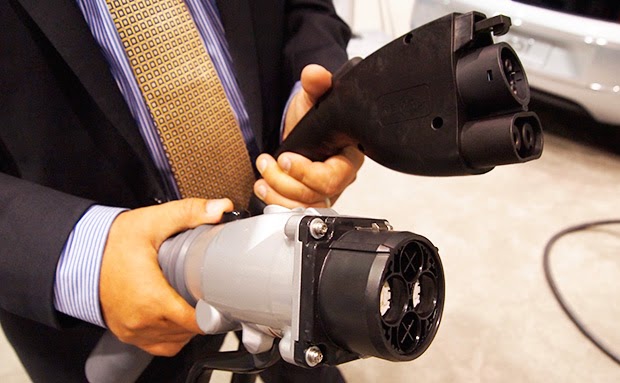The Japanese automakers have just announced a joint venture on charging infrastructure that points in a very good direction. The JV, Nippon Charge Service, LLC, is tasked with promoting “the installation of chargers for electric-powered vehicles (PHVs, PHEVs, EVs)” and “the installation of chargers, for the good of society and to expand the use of electric-powered vehicles.”
The idea is a breath of fresh air compared with what amounts to infighting between automakers in other parts of the world.
For the project of electric vehicle adoption to work well one big part of the puzzle is building out enough EV charging infrastructure to ease the worries of potential electric car buyers.
We’ve long described the electric car buying quandary as a chicken-and-egg scenario. Car buyers will be reluctant to by EV’s until there’s enough infrastructure, and the infrastructure companies will be reluctant to build until there’s enough EV’s on the road.
In the U.S. (and perhaps Europe) we have a fractured picture in fast charging. Tesla Motors is building a fast charging network, and Nissan is building a fast charging network, and a couple 3rd party companies are building charging infrastructure that’s mostly level 2 charging. In the public level 2 charging isn’t so useful, and fast charging is eminently preferable. The best you can say about public level 2 charging is that it’s better than nothing.
In any case the point is these fast charging networks, Tesla’s and Nissan’s, are incompatible. Meaning, the automakers aren’t cooperating with each other on building charging infrastructure.
The incompatibility isn’t just between Tesla and Nissan. There’s also the Combo Charging System that most of the other automakers support, but there are very few EV’s being sold to use that system. As a result there isn’t much push, that I’m aware of, toward supporting CCS fast charging stations. But if there were such a push, it would mean there’d be three flavors of fast charging available, because the automakers aren’t collaborating on fast charging standards.
The three camps among the automakers – a) Tesla Motors, b) Nissan/Mitsubishi/Japanese, c) China, d) everyone else – okay, that’s four camps – didn’t manage do cooperate, sticking us the EV buying public with incompatible standards.
One hopes the other automakers will take note that it’s possible for automakers to cooperate and develop something for the good of society.
On the other hand – the press release includes two companies (Toyota and Honda) that are barely giving lip service to plug-in electric vehicles because both are pushing hard for fuel cell vehicles – and a third company (Mitsubishi) whose EV program is having problems. In effect this press release is about Nissan pushing for charging infrastructure installation, just as Nissan has been doing in the U.S. (?and Europe?).
Here’s the full press release:
Nissan Motor Co., Ltd.
Honda Motor Co., Ltd.
Mitsubishi Motors Corporation
Development Bank of Japan Inc.
Overview of Nippon Charge Service
| Name of company | Nippon Charge Service, LLC |
| Headquarters | Room No. 2, 6F, Mita Nitto Dai Bldg., 3-11-36 Mita, Minato-ku, Tokyo |
| Founded | May 26, 2014 |
| Stakeholders | Toyota Motor Corporation, Nissan Motor Co., Ltd. Honda Motor Co., Ltd., Mitsubishi Motors Corporation Development Bank of Japan Inc. (TBD) |
| Capitalization | 80 million yen (excluding DBJ’s planned investment amount) |
| Websites | Company overview: http://www.nippon-juden.co.jp (to be available in mid-June) Assistance program: http://tnhm-juuden.com/ |
*1
DBJ has established the “Fund for Japanese Industrial Competitiveness” to enhance Japan’s competitiveness through the supply of risk money to the nation’s industries. The fund will encourage firms to turn their latent capabilities into new businesses by extending business frontiers and promoting strategic alliances with other firms. DBJ’s support for such activity will foster firms’ corporate growth.
- Highway design could decrease death and injury risk, if “we” chose smarter designs - March 28, 2015
- GM really did trademark “range anxiety”, only later to abandon that mark - March 25, 2015
- US Government releases new regulations on hydraulic fracturing, that some call “toothless” - March 20, 2015
- Tesla Motors magic pill to solve range anxiety doesn’t quite instill range confidence - March 19, 2015
- Update on Galena IL oil train – 21 cars involved, which were the supposedly safer CP1232 design - March 7, 2015
- Another oil bomb train – why are they shipping crude oil by train? – Symptoms of fossil fuel addiction - March 6, 2015
- Chevron relinquishes fracking in Romania, as part of broader pull-out from Eastern European fracking operations - February 22, 2015
- Answer anti- electric car articles with truth and pride – truth outshines all distortions - February 19, 2015
- Apple taking big risk on developing a car? Please, Apple, don’t go there! - February 16, 2015
- Toyota, Nissan, Honda working on Japanese fuel cell infrastructure for Japanese government - February 12, 2015













